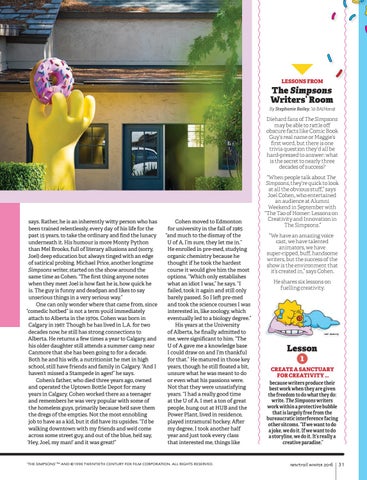LESSONS FROM
The Simpsons Writers’ Room By Stephanie Bailey, ’10 BA(Hons)
Diehard fans of The Simpsons may be able to rattle off obscure facts like Comic Book Guy’s real name or Maggie’s first word, but there is one trivia question they’d all be hard-pressed to answer: what is the secret to nearly three decades of success?
says. Rather, he is an inherently witty person who has been trained relentlessly, every day of his life for the past 15 years, to take the ordinary and find the lunacy underneath it. His humour is more Monty Python than Mel Brooks, full of literary allusions and (sorry, Joel) deep education but always tinged with an edge of satirical probing. Michael Price, another longtime Simpsons writer, started on the show around the same time as Cohen. “The first thing anyone notes when they meet Joel is how fast he is, how quick he is. The guy is funny and deadpan and likes to say unserious things in a very serious way.” One can only wonder where that came from, since “comedic hotbed” is not a term you’d immediately attach to Alberta in the 1970s. Cohen was born in Calgary in 1967. Though he has lived in L.A. for two decades now, he still has strong connections to Alberta. He returns a few times a year to Calgary, and his older daughter still attends a summer camp near Canmore that she has been going to for a decade. Both he and his wife, a nutritionist he met in high school, still have friends and family in Calgary. “And I haven’t missed a Stampede in ages!” he says. Cohen’s father, who died three years ago, owned and operated the Uptown Bottle Depot for many years in Calgary. Cohen worked there as a teenager and remembers he was very popular with some of the homeless guys, primarily because he’d save them the dregs of the empties. Not the most ennobling job to have as a kid, but it did have its upsides. “I’d be walking downtown with my friends and we’d come across some street guy, and out of the blue, he’d say, ‘Hey, Joel, my man!’ and it was great!”
Cohen moved to Edmonton for university in the fall of 1985 “and much to the dismay of the U of A, I’m sure, they let me in.” He enrolled in pre-med, studying organic chemistry because he thought if he took the hardest course it would give him the most options. “Which only establishes what an idiot I was,” he says. “I failed, took it again and still only barely passed. So I left pre-med and took the science courses I was interested in, like zoology, which eventually led to a biology degree.” His years at the University of Alberta, he finally admitted to me, were significant to him. “The U of A gave me a knowledge base I could draw on and I’m thankful for that.” He matured in those key years, though he still floated a bit, unsure what he was meant to do or even what his passions were. Not that they were unsatisfying years. “I had a really good time at the U of A. I met a ton of great people, hung out at HUB and the Power Plant, lived in residence, played intramural hockey. After my degree, I took another half year and just took every class that interested me, things like
‘THE SIMPSONS’ TM AND ©1990 TWENTIETH CENTURY FOX FILM CORPORATION. ALL RIGHTS RESERVED.
“When people talk about The Simpsons, they’re quick to look at all the obvious stuff,” says Joel Cohen, who entertained an audience at Alumni Weekend in September with “The Tao of Homer: Lessons on Creativity and Innovation in The Simpsons.” “We have an amazing voice cast, we have talented animators, we have super‑ripped, buff, handsome writers, but the success of the show is the environment that it’s created in,” says Cohen. He shares six lessons on fuelling creativity.
Lesson CREATE A SANCTUARY FOR CREATIVITY … because writers produce their best work when they are given the freedom to do what they do: write. The Simpsons writers work within a protective bubble that is largely free from the bureaucratic interference facing other sitcoms. “If we want to do a joke, we do it. If we want to do a storyline, we do it. It’s really a creative paradise.”
new trail winter 2016 31
